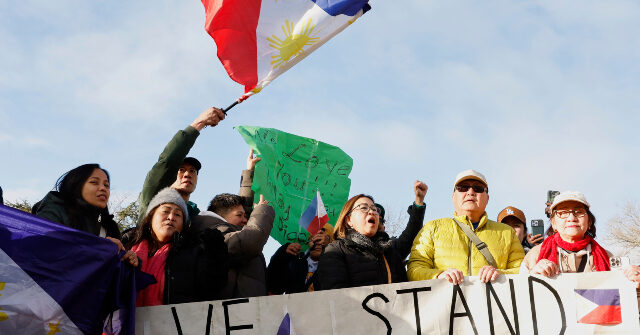Former Philippine President Rodrigo Duterte is running for the position he held before the presidency — mayor of his hometown Davao City — even though he is currently in detention at the Hague on charges of crimes against humanity.
He is strongly favored to win his latest race for the mayor’s office.
Duterte, now 80 years old, was first elected mayor of Davao City in 1988. He was re-elected twice, then had to step aside in 1998 due to term limits, but he simply bided his time by holding a seat in the Philippine House of Representatives until 2001 and ran for mayor again.
When term limits interrupted the perpetual Duterte mayoralty again in 2010, his daughter Sara Durterte ran for mayor in his stead — and he served as her vice mayor. He marched back into the mayor’s office in 2013 and handed the vice mayor’s desk to his son Paolo.
Duterte went on to the presidency in 2016, where he quickly launched a “war on drugs” that featured thousands of extrajudicial killings by vigilante “death squads.” He was brusque in dismissing the concerns of human rights activists, and he has refused to apologize for any of his actions.
When the United Nations discussed sending an observer to the Philippines in 2016, Duterte threatened to “whack him in the head.” He has boasted of personally killing criminals by shooting them and tossing them out of helicopters.
Davao City seems to have an unlimited appetite for Duterte as mayor, and the International Criminal Court (ICC) indicting him for the blood spilled during his aggressive drug war does not appear to have curbed that appetite.
To his apparent surprise, Duterte was arrested in early March and brought to the headquarters of the ICC in the Netherlands to face charges of human rights violations. He was taken into custody while visiting Hong Kong with his daughter Sara, who became vice president after Duterte concluded his term as president.
“What was my sin? I did everything in my time so Filipinos can have a little peace and tranquility,” Duterte said when he was arrested. “If this is my fate in life, it’s OK, I’ll accept it. I can’t do anything if I get arrested and jailed.”
Sara Duterte took the vice presidential office in an alliance with the scion of the other powerful Filipino political dynasty, President Ferdinand Marcos Jr., but that alliance has since been shattered, turning the upcoming election into a Duterte-Marcos power struggle. She was impeached in February for threatening to assassinate President Marcos.
At the time of his arrest, the former president said he was planning to run for mayor of Davao City again in the May 12 election. Reuters on Friday found Duterte remains popular in the city and is leading in the polls, although his influence in the rest of the country appears to have diminished.
“I’ve seen what he accomplished as both mayor and president, from his fight against drug lords to what he did for the country. No matter what happens, we’re solidly for Duterte,” said Davao City voter Jennifer Maumbas, 28, who works in a cafe that proudly displayed a Duterte banner.
Joel Sagosoy Valles, manager of another restaurant festooned with Duterte photos, said his family “cried” and “could not sleep for three days” when the ICC arrested Duterte.
“We always vote Duterte, no matter what. I think the support is strong because they effectively control Davao,” faithful voter Edwin Esteves told Nikkei Asia last week.
A great deal of Duterte’s enduring popularity comes from supporters who give him credit for cracking down on crime, however brutal his methods might have been.
“The Dutertes’ popularity in Davao City hinges on keeping the family name relevant, a tactic perfected long ago by political clans such as the Binays, the Estradas, and the Villars across the nation, as well as Filipinos’ preference for strongmen,” Nikkei Asia observed.
The Philippine attraction to aggressive leaders and political dynasties is so strong that reformist candidates have proposed laws that would block members of the same family from running for political office. To date, no such effort has produced effective legislation.
Philippine officials have given conflicting answers about whether Duterte would be able to take office from his detention cell in the Hague if he wins the election in Davao City. George Garcia, chair of the Commission on Elections (Comelec), told the Philippine Inquirer that election laws would allow Duterte to be proclaimed the winner “in absentia,” but what happens after that proclamation is more of a “gray area.”
Duterte would probably be ruled “permanently incapacitated,” because under Philippine law, “temporary” incapacitation cannot last more than 30 days, and the ICC will not begin prosecuting Duterte in earnest until September.
On the other hand, the Philippine election code stipulates that only conviction on criminal charges can “disqualify” a candidate. Garcia was not certain if conviction by a foreign court like the ICC would meet this standard.
The simplest solution to the potential conflict would be for the Hague to grant Duterte an interim release from custody while the charges against him are processed, but the Inquirer was uncertain whether Duterte would request a release – he often talks about “accepting his fate” – as well as whether the ICC would grant a release if he asked for it.
Read the full article here
